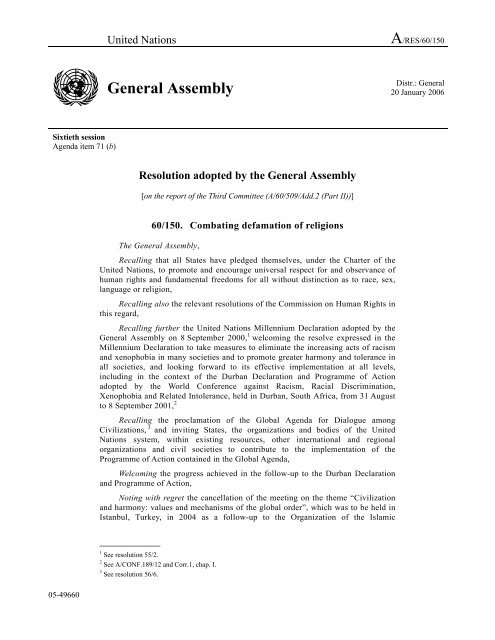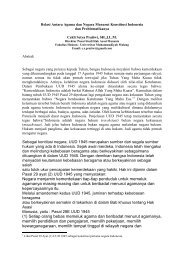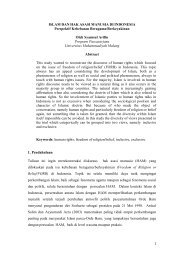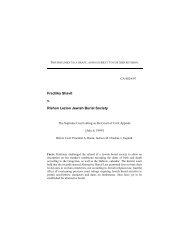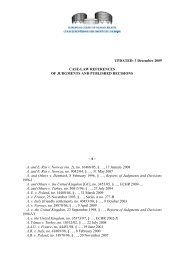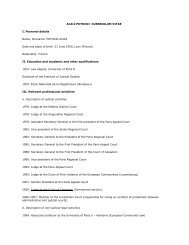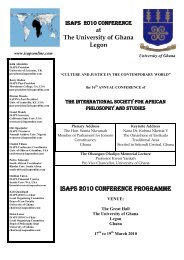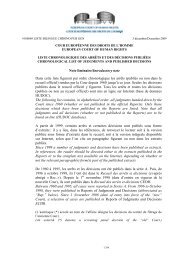General Assembly resolution 60/150 - Religion and Law Consortium
General Assembly resolution 60/150 - Religion and Law Consortium
General Assembly resolution 60/150 - Religion and Law Consortium
Create successful ePaper yourself
Turn your PDF publications into a flip-book with our unique Google optimized e-Paper software.
United Nations A/RES/<strong>60</strong>/<strong>150</strong><br />
<strong>General</strong> <strong>Assembly</strong><br />
Distr.: <strong>General</strong><br />
20 January 2006<br />
Sixtieth session<br />
Agenda item 71 (b)<br />
Resolution adopted by the <strong>General</strong> <strong>Assembly</strong><br />
[on the report of the Third Committee (A/<strong>60</strong>/509/Add.2 (Part II))]<br />
<strong>60</strong>/<strong>150</strong>. Combating defamation of religions<br />
The <strong>General</strong> <strong>Assembly</strong>,<br />
Recalling that all States have pledged themselves, under the Charter of the<br />
United Nations, to promote <strong>and</strong> encourage universal respect for <strong>and</strong> observance of<br />
human rights <strong>and</strong> fundamental freedoms for all without distinction as to race, sex,<br />
language or religion,<br />
Recalling also the relevant <strong>resolution</strong>s of the Commission on Human Rights in<br />
this regard,<br />
Recalling further the United Nations Millennium Declaration adopted by the<br />
<strong>General</strong> <strong>Assembly</strong> on 8 September 2000, 1 welcoming the resolve expressed in the<br />
Millennium Declaration to take measures to eliminate the increasing acts of racism<br />
<strong>and</strong> xenophobia in many societies <strong>and</strong> to promote greater harmony <strong>and</strong> tolerance in<br />
all societies, <strong>and</strong> looking forward to its effective implementation at all levels,<br />
including in the context of the Durban Declaration <strong>and</strong> Programme of Action<br />
adopted by the World Conference against Racism, Racial Discrimination,<br />
Xenophobia <strong>and</strong> Related Intolerance, held in Durban, South Africa, from 31 August<br />
to 8 September 2001, 2<br />
Recalling the proclamation of the Global Agenda for Dialogue among<br />
Civilizations, 3 <strong>and</strong> inviting States, the organizations <strong>and</strong> bodies of the United<br />
Nations system, within existing resources, other international <strong>and</strong> regional<br />
organizations <strong>and</strong> civil societies to contribute to the implementation of the<br />
Programme of Action contained in the Global Agenda,<br />
Welcoming the progress achieved in the follow-up to the Durban Declaration<br />
<strong>and</strong> Programme of Action,<br />
Noting with regret the cancellation of the meeting on the theme “Civilization<br />
<strong>and</strong> harmony: values <strong>and</strong> mechanisms of the global order”, which was to be held in<br />
Istanbul, Turkey, in 2004 as a follow-up to the Organization of the Islamic<br />
_______________<br />
1 See <strong>resolution</strong> 55/2.<br />
2 See A/CONF.189/12 <strong>and</strong> Corr.1, chap. I.<br />
3 See <strong>resolution</strong> 56/6.<br />
05-496<strong>60</strong>
A/RES/<strong>60</strong>/<strong>150</strong><br />
Conference-European Union joint forum on the theme “Civilization <strong>and</strong> harmony:<br />
the political dimension”, held in Istanbul on 12 <strong>and</strong> 13 February 2002, <strong>and</strong><br />
underscoring the fact that such initiatives to deepen dialogue <strong>and</strong> reinforce<br />
underst<strong>and</strong>ing between the two biggest groups of nations of Eurasia <strong>and</strong> Africa will<br />
be continued,<br />
Reaffirming that discrimination against human beings on the grounds of<br />
religion or belief constitutes an affront to human dignity <strong>and</strong> a disavowal of the<br />
principles of the Charter,<br />
Convinced that religious <strong>and</strong> cultural diversity in a globalizing world needs to<br />
be used as a vehicle for creativity, dynamism <strong>and</strong> the promotion of social justice,<br />
tolerance <strong>and</strong> underst<strong>and</strong>ing, as well as international peace <strong>and</strong> security, <strong>and</strong> not as a<br />
rationale for a new ideological <strong>and</strong> political confrontation,<br />
Recognizing the valuable contributions of all religions to modern civilization<br />
<strong>and</strong> the contribution that dialogue among civilizations can make to an improved<br />
awareness <strong>and</strong> underst<strong>and</strong>ing of the common values shared by all humankind,<br />
Reaffirming that cultural diversity is a cherished asset for the advancement <strong>and</strong><br />
welfare of humanity at large <strong>and</strong> should be valued, enjoyed, genuinely accepted <strong>and</strong><br />
embraced as a permanent feature that enriches our societies,<br />
Emphasizing that States, non-governmental organizations, religious bodies <strong>and</strong><br />
the media have an important role to play in promoting tolerance <strong>and</strong> freedom of<br />
religion <strong>and</strong> belief, in particular through education that teaches tolerance <strong>and</strong> respect<br />
for religion <strong>and</strong> belief,<br />
Alarmed at the continuing negative impact of the events of 11 September 2001<br />
on Muslim minorities <strong>and</strong> communities in some non-Muslim countries, the negative<br />
projection of Islam in the media <strong>and</strong> the introduction <strong>and</strong> enforcement of laws that<br />
specifically discriminate against <strong>and</strong> target Muslims,<br />
Alarmed also at the serious instances of intolerance, discrimination <strong>and</strong> acts of<br />
violence based on religion or belief, intimidation <strong>and</strong> coercion motivated by<br />
extremism, religious or otherwise, occurring in many parts of the world <strong>and</strong><br />
threatening the enjoyment of human rights <strong>and</strong> fundamental freedoms,<br />
Noting with concern that defamation of religions is among the causes of social<br />
disharmony <strong>and</strong> leads to violations of human rights,<br />
Noting with deep concern the increasing trend in recent years of statements<br />
attacking religions, Islam <strong>and</strong> Muslims in particular, especially in human rights<br />
forums,<br />
1. Expresses deep concern at the negative stereotyping of religions <strong>and</strong><br />
manifestations of intolerance <strong>and</strong> discrimination in matters of religion or belief still<br />
in evidence in some regions of the world;<br />
2. Strongly deplores physical attacks <strong>and</strong> assaults on businesses, cultural<br />
centres <strong>and</strong> places of worship of all religions as well as targeting of religious<br />
symbols;<br />
3. Notes with deep concern the intensification of the campaign of<br />
defamation of religions <strong>and</strong> the ethnic <strong>and</strong> religious profiling of Muslim minorities<br />
in the aftermath of the tragic events of 11 September 2001;<br />
4. Expresses its deep concern that Islam is frequently <strong>and</strong> wrongly<br />
associated with human rights violations <strong>and</strong> terrorism;<br />
2
A/RES/<strong>60</strong>/<strong>150</strong><br />
5. Also expresses its deep concern at programmes <strong>and</strong> agendas pursued by<br />
extremist organizations <strong>and</strong> groups aimed at the defamation of religions, in<br />
particular when supported by Governments;<br />
6. Deplores the use of the print, audio-visual <strong>and</strong> electronic media,<br />
including the Internet, <strong>and</strong> any other means to incite acts of violence, xenophobia or<br />
related intolerance <strong>and</strong> discrimination against Islam or any other religion;<br />
7. Recognizes that, in the context of the fight against terrorism <strong>and</strong> the<br />
reaction to counter-terrorism measures, defamation of religions becomes an<br />
aggravating factor that contributes to the denial of fundamental rights <strong>and</strong> freedoms<br />
of target groups, as well as their economic <strong>and</strong> social exclusion;<br />
8. Stresses the need to effectively combat defamation of all religions, Islam<br />
<strong>and</strong> Muslims in particular, especially in human rights forums;<br />
9. Urges States to take resolute action to prohibit the dissemination through<br />
political institutions <strong>and</strong> organizations of racist <strong>and</strong> xenophobic ideas <strong>and</strong> material<br />
aimed at any religion or its followers that constitute incitement to discrimination,<br />
hostility or violence;<br />
10. Also urges States to provide, within their respective legal <strong>and</strong><br />
constitutional systems, adequate protection against acts of hatred, discrimination,<br />
intimidation <strong>and</strong> coercion resulting from defamation of religions, to take all possible<br />
measures to promote tolerance <strong>and</strong> respect for all religions <strong>and</strong> their value systems<br />
<strong>and</strong> to complement legal systems with intellectual <strong>and</strong> moral strategies to combat<br />
religious hatred <strong>and</strong> intolerance;<br />
11. Urges all States to ensure that all public officials, including members of<br />
law enforcement bodies, the military, civil servants <strong>and</strong> educators, in the course of<br />
their official duties, respect different religions <strong>and</strong> beliefs <strong>and</strong> do not discriminate<br />
on the grounds of religion or belief, <strong>and</strong> that necessary <strong>and</strong> appropriate education or<br />
training is provided;<br />
12. Underscores the need to combat defamation of religions by strategizing<br />
<strong>and</strong> harmonizing actions at the local, national, regional <strong>and</strong> international levels<br />
through education <strong>and</strong> awareness-raising;<br />
13. Urges States to ensure equal access to education for all, in law <strong>and</strong> in<br />
practice, including access to free primary education for all children, both girls <strong>and</strong><br />
boys, <strong>and</strong> access for adults to lifelong learning <strong>and</strong> education based on respect for<br />
human rights, diversity <strong>and</strong> tolerance, without discrimination of any kind, <strong>and</strong> to<br />
refrain from any legal or other measures leading to racial segregation in access to<br />
schooling;<br />
14. Calls upon the international community to initiate a global dialogue to<br />
promote a culture of tolerance <strong>and</strong> peace based on respect for human rights <strong>and</strong><br />
religious diversity, <strong>and</strong> urges States, non-governmental organizations, religious<br />
bodies <strong>and</strong> the print <strong>and</strong> electronic media to support <strong>and</strong> promote such a dialogue;<br />
15. Calls upon the United Nations High Commissioner for Human Rights to<br />
promote <strong>and</strong> include human rights aspects in the dialogue among civilizations, inter<br />
alia, through:<br />
(a) Integrating them into topical seminars <strong>and</strong> special debates on the positive<br />
contributions of cultures, as well as religious <strong>and</strong> cultural diversity, including<br />
3
A/RES/<strong>60</strong>/<strong>150</strong><br />
through educational programmes, particularly the World Programme for Human<br />
Rights Education proclaimed on 10 December 2004; 4<br />
(b) Collaboration by the Office of the United Nations High Commissioner<br />
for Human Rights with other relevant international organizations in holding joint<br />
conferences designed to encourage this dialogue <strong>and</strong> promote underst<strong>and</strong>ing of the<br />
universality of human rights <strong>and</strong> their implementation at various levels;<br />
16. Requests the Secretary-<strong>General</strong> to submit a report on the implementation<br />
of the present <strong>resolution</strong> to the <strong>General</strong> <strong>Assembly</strong> at its sixty-first session.<br />
64th plenary meeting<br />
16 December 2005<br />
_______________<br />
4 See <strong>resolution</strong>s 59/113 A <strong>and</strong> B.<br />
4


